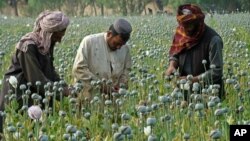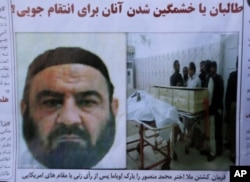Afghan Taliban appear to be facing financial pressure since the death of their former leader Mullah Akhtar Mansour, who was more adept at managing money, according to the spokesman of NATO’s Resolute Support mission in Afghanistan.
“The evidence we’ve seen of that is an increase in their taxes to locals as they move through,” Brigadier General Charles Cleveland said Wednesday in Kabul. “We believe that the death of Mullah Mansour certainly contributed to that as well.”
Mansour, who was killed in a U.S. drone strike in Pakistan’s Balochistan province in May, had financial acumen that, along with his involvement in the narcotics trade, helped grow the group’s war chest, Cleveland said.
Drug trafficking
Afghanistan’s vast drug trade is one of the most lucrative sources of funds for the Taliban. According to a New York Times story on the Taliban’s drug links, Mansour was “at the pinnacle of a pyramid of tribal Ishaqzai drug traffickers.” In the process he amassed personal wealth, bought off opposition within the group, and helped the Taliban financially.
His death has probably hampered efforts by the Taliban to take advantage of a record poppy crop this year.
“It was a good harvest and we did expect the Taliban to be flush with money, but since that time of course Mansour was killed and we have seen this evidence, in particular the taxes being raised on the local population,” Cleveland said.
Hamed Sabori, a political analyst, said one of the reasons the Taliban may be raising taxes is because of the additional burden on their resources.
“The fighting has intensified in the last couple of months, so obviously it requires more resources,” Sabori said. “I think that is why they have to raise taxes and find other sources of revenue.”
The financial pressure could be affecting Taliban operational readiness. But Cleveland acknowledged the insurgent group manages to offset some of that pressure through their field operations against Afghan security forces.
“Of course what we’ve also seen is that they will raid a checkpoint and they kind of restock some of their supplies as well,” Cleveland added.
War is cheap
Javed Kohistani, a former general and military analyst based in Kabul, said that the war is not expensive for the Taliban to fight.
They captured resources from the Afghan army and controlled areas where ammunition was not that expensive: One bullet for an AK-47 assault rifle sells for five to 10 cents, he said.
The Taliban, he added, are trying to expand their financial resources by controlling more areas so they could get more taxes from cellphone companies and construction companies, as well as zakat, a mandatory charitable giving for Muslims who met certain financial criteria.





